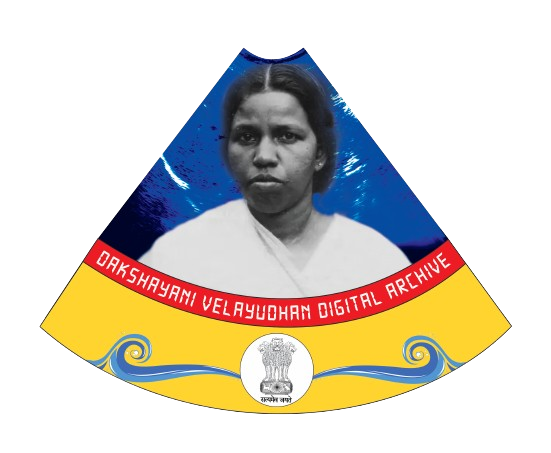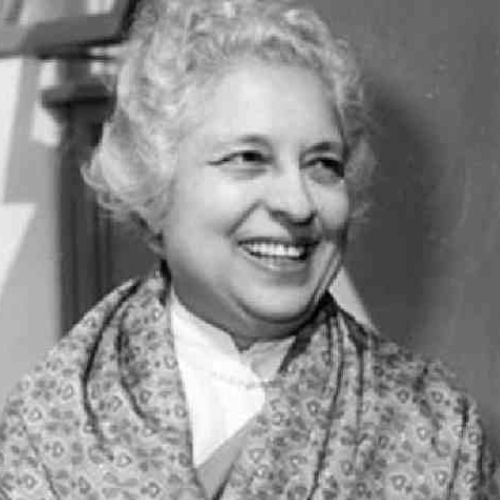Born on August 18, 1900, in Allahabad, she carved a prominent niche in India’s political and diplomatic arenas. Notably, she was the sister of India’s first Prime Minister, Jawaharlal Nehru, and her multifaceted career spanned political leadership, diplomacy, and literary pursuits.
Basic details and biography of Vijaya Lakshmi Pandit:
| Attribute | Details |
| Full Name | Vijaya Lakshmi Pandit |
| Birthdate | August 18, 1900 |
| Birthplace | Allahabad |
| Party Affiliation | Indian National Congress |
| Constituency | United Provinces |
| Mother Tongue | Hindi |
| Education | No Formal Education |
| Committee Memberships | None |
| Role in the Independence Movement | Imprisoned thrice (1932-33, 1940, 1942-43) |
| Cabinet Post (Pre-Independent India) | Minister of Local Self-Government and Public Health (1937) |
| Constituent Assembly (1946) | Elected Member |
| Diplomatic Career | Ambassador to Soviet Union (1947-49), United States and Mexico (1949-51), Ireland (1955-61), Spain (1956-61) |
| UN General Assembly President | 1953, the first woman to hold this position |
| Governor of Maharashtra | 1962-1964 |
| Return to Parliament | Elected from Phulpur (1964-1968) |
| Literary Contributions | “So I Became a Minister,” “Prison Days,” “The Scope of Happiness: A Personal Memoir” |
| Key Speeches | Support for Nehru’s Objective Resolution, emphasizing ‘social, economic, and cultural justice’ |
Early Life:
Vijaya Lakshmi Pandit, initially named Swarup Kumari Nehru, was born to Motilal Nehru, a renowned lawyer and freedom fighter. Despite not receiving formal education, she was privately tutored. In 1921, she married Ranjit Sitaram Pandit, adopting the name by which she is widely recognized today.
Role in India’s Independence Movement:
A fervent participant in the independence struggle, Vijaya Lakshmi Pandit’s commitment led to her imprisonment on three occasions – in 1932-1933, 1940, and 1942-1943. Her involvement in the freedom movement underscored her dedication to the cause of India’s independence.
Contribution to Constitution Making:
Elected to the Constituent Assembly from the United Provinces under the Congress party banner, Pandit played a crucial role in shaping the foundational document of independent India.
Later Contributions:
Post-independence, Pandit transitioned into an illustrious diplomatic career. She served as India’s ambassador to the Soviet Union (1947-1949), the United States and Mexico (1949-1951), Ireland (1955-1961), and Spain (1956-1961). From 1946 to 1968, she headed the Indian delegation to the United Nations, becoming the first woman President of the United Nations General Assembly in 1953.
Her return to India saw her appointed as the Governor of Maharashtra (1962-1964). Subsequently, she entered active politics, winning the Lok Sabha elections from Phulpur after Jawaharlal Nehru’s demise, serving in the Parliament until 1968.
Literary Contributions:
Vijaya Lakshmi Pandit’s intellectual legacy extends to her writings. Notable works include “So I Became a Minister,” “Prison Days,” and her autobiography, “The Scope of Happiness: A Personal Memoir.”
Key Speeches:
Pandit’s support for Nehru’s Objective Resolution, emphasizing ‘social, economic, and cultural justice,’ reflected her commitment to inclusive governance.
Legacy:
Even in retirement, Pandit remained engaged in Indian political discourse. She openly expressed dissent against her niece, Indira Gandhi, criticizing emergency measures.
Vijaya Lakshmi Pandit’s life is a testament to her unwavering dedication to India’s freedom struggle, her diplomatic prowess, and her literary contributions. Her legacy continues to inspire generations, marking her as a trailblazer in Indian history.
Selected Speeches from Constitutional Assembly Debates:
Centrality of New Asia in Post-Raj World-Order[1]
The Hon’ble Shrimati Vijayalakshmi Pandit (United Provinces: General): Mr. President, it was my privilege in 1937 to move the first resolution after the inauguration of Provincial Autonomy in my Province, demanding a Constituent Assembly to draw up a Constitution for an independent India. Today, ten years later, that Constituent Assembly is meeting here. This is a historic milestone in our progress toward freedom and yet, Sir, freedom remains just a little beyond our grasp. Imperialism dies hard and even though it knows its days are numbered, it struggles for survival. We have before us the instance of what is happening in Burma, in Indonesia, in Indo-China, and we see, how in those countries, in spite of the desperate efforts that the peoples are putting up to free themselves, the stranglehold of imperialism is so great that they are unable easily to shake it off. Reactionary elements in every country are getting together, Sir, under the guise of seeking protection, clinging to the Imperialist power and trying thereby to strengthen it. We have seen the sorry spectacle of what happened in San Francisco when the United Nations Organization was being born. The Asiatic nations assembled there, were dominated by the Imperialist powers and could not speak independently but only echoed the voice of their respective Imperialist powers. The result has already been seen in the fact that in spite of the brave words of the Charter, that came into existence at that time, no implementation of that Charter was possible because there was not enough strength behind it. The peoples of Asia were silent and could not insist upon its implementation. Even today, Asia is far behind the peoples of Europe in representation in the United Nations and it was perhaps the first time in history that at the last United Nations Assembly, a country, not free itself, was able to raise its voice for the freedom of oppressed and dependent peoples all over the world (cheers). The fact, that the United Nations Assembly has recognized this, is because India even today has shown within herself the power of giving a lead to the world. An Independent India would no doubt assume leadership not only of Asia but of the world, and so when we meet here in this Assembly to draw up the future Constitution of our country, we must not forget that it is not only to ourselves we owe a duty but also to the world which looks to us.
The Resolution before us stresses complete freedom for the individual and concedes guarantees to every legitimate group. Therefore in this there is no justification for fear for the minorities. Even though certain minorities have special interests to safeguard they should not forget, that they are parts of the whole, and if the larger interest suffers, there can be no question of real safeguarding of the interest of any minority. In an independent India minorities will not be able to look to outside powers for help without being termed ‘traitors’. We have had too much talk of rights in recent years and very little about obligations. This approach to any problem is unfortunate. The Resolution before us deals with problems which are fundamental to all of us and only to the extent that they are solved, can we safeguard the rights of any special minority. The Resolution indicates clearly that in an independent India the fullest social, economic and cultural justice to individuals and groups will be conceded and through our design for living, we shall be helping other nations to decide the pattern of their own lives. Our own design must therefore be right and must be made with the co-operation and strength of the entire country.
Of all the Asiatic countries, India alone has stood for democracy throughout the years. In all our chequered history we have fought for the will of the people to triumph. In recent years, even at great peril and at personal sacrifice, the people of this country have adhered to the ideal of democracy, and, today, we are in a position of showing to the world that we can implement our ideals. The Resolution under discussion is clear in substance and in wording, but I would like to stress two points.
We have before us two aspects — the positive and the negative. The negative aspect is concerned with the ending of the imperialist domination of our country and in that we all agree. But the more important side to the question is the positive side, which means the building up in our country of a social democratic State which will enable India to fulfil her destiny and point the path of lasting peace and progress to the world. At this moment in our national history, we cannot afford to fritter away our energies in any talk or action which will defeat our objective, nor must we indulge in unreasoning fears. We must accept the challenge that has been offered and march together in order to realise the positive side of this picture.
The end of the war has created many problems, difficult in themselves and made more complex by the fact that individual demands are placed before the interest of the whole; that many nations, being still dependent, are unable to raise their voice in support or protest. But India is in a position to contribute substantially to a solution of the present problems and also in maintaining peace and security in the world. A free India becomes a power for the forces of progress. In this age of the building up of one world, we cannot talk of separate nations. We have to work in order to build up one world, of which India shall be a worthy partner. India has the right to lead because of her heritage, and also because of her present, when, in the face of the complexity of her own problems, she has stood up and estimated values and not let go all those ideals which she had placed before her. Our contribution to the future is one of neutralisation of political and social discontents and to that end, we must work by the establishment of freedom in our own country and helping all those who strive for freedom in the world. Unless Asia comes into her own the world cannot function as a whole. A world which is divided into groups cannot be secure. A famous American has said, “No nation can exist half slave and half free”. The same applies to the world, since freedom is not divisible. India must free herself socially, economically and then free others, and in the Resolution before us we find an attempt to work towards that end. By it, we redeem the pledge we have taken. I appeal to the Members of this House to pass the Resolution in order to show that this ancient land is conscious of the challenge that has been presented to her and can live up to the ideals and heritage of her past.
[1] Debate over Pandit Jawaharlal Nehru’s Resolution regarding Aims and Objectives, C.A.D., Vol. II, L.S.S., 20 January 1947, pp. 277-279.

